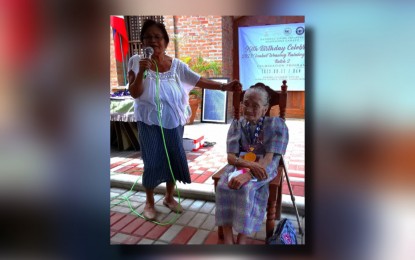
LIVING TREASURES. Adelita Romualdo Bagcal chants dallot during the 99th birthday celebration of weaver Magdalena Gamayo, a national living treasure from Pinili, Ilocos Norte, in this undated photo. Bagcal now shares the spotlight with Gamayo after she was also named a National Living Treasure through Proclamation No. 427 released Dec. 15, 2023. (Photo courtesy of Edwin Antonio)
LAOAG CITY – "Dallot," a native chant delivered during special occasions by the Ilokano community in the olden times, remains alive to this day, thanks to natives who have kept the tradition.
Adelita Romualdo Bagcal, 77, has clung on to it like a lullaby since she was a child.
In recognition of her extraordinary skill and dedication to preserve and promote this oral tradition to the younger generation, President Ferdinand R. Marcos Jr. through Proclamation No. 427 has named her a “Manlilikha ng Bayan” or national living treasure.
The National Living Treasures Award is the highest state honor conferred to a Filipino in recognition of exemplary work in any form of traditional art.
Bagcal, a widow from Sitio Calao, Barangay 4 Marcos in Banna, Ilocos Norte, is a dallot master.
She is also an expert in "duayya" (Ilokano lullaby) and "dung-aw" (mourning ritual).
In an interview, Bagcal recalled accompanying her grandmother, Veronica Suguitan Urbano, when the latter would occasionally join a community of elders during a traditional wedding proposal.
Part of the Ilokano ritual is for an elder to perform dallot, an improvised, versified, and impromptu long poem delivered in a chant in front of a man and woman who plan to marry, with the blessing of their parents and nearest kins.
Dallot is likewise performed during special celebrations like birthdays or feasts.
Her exposure to the oral tradition has earned her the title “dumadallot" or Dallot Queen of the North.
On several occasions, Bagcal would receive invitation from officials, including former First Lady and congresswoman Imelda Marcos, to perform dallot.
She said dallot comes out naturally every time she chants in public.
“This is a golden treasure I inherited from my forefathers. I am proud of it,” she said, adding she would gladly welcome any invitation to perform dallot in the community or even in schools in Banna for the sake of preserving the oral tradition.
Modern-day wedding preparations may no longer carry dallot as part of the ritual but Bagcal believes it will continue to thrive across generations for as long as people value their cultural identity.
She said she is also happy that in her town, she has trained several students of Banna National High School (BNHS), including her grandson who is now a public school teacher, Jessie Bagcal, towards the preservation of cultural heritage including dallot.
“With tears in my eyes and joy in my heart, I salute the Gawad Manlilikha ng Bayan from my hometown, Banna,” Joel Manuel, former BNHS principal and an advocate for Ilokano Literature, said during a special program for the preservation of cultural heritage among students in the province.
Through his documentation and with the help of fellow officials and members of the Gunglo Dagiti Mannurat nga Ilokano or the Association of Ilokano Writers in the Philippines - Ilocos Norte who submitted the nomination to the National Commission for Culture and the Arts in 2021, Bagcal earned the prestigious award.
Manuel said the Ilokano oral traditions have waned over the years but with the President’s latest proclamation, it will survive the test of time.
The other eight awardees were Abina Tawide Coguit (embroiderer from La Paz, Agusan del Sur), Sakinur-ain Mugong Delasas (Sama master of traditional dance from Bongao, Tawi-Tawi) and Bundos Bansil Fara (T’boli brasscaster from Lake Sebu, South Cotabato); and artists Marife Ravidas Ganahon, Amparo Balansi Mabanag, Samporonia Pagsac Madanlo, Barbara Kibed Ofong and Rosie Godwino Sula.
Senate President Pro Tempore Loren lauded the awardees for their exemplary contribution to Philippine arts and culture.
"We are delighted to learn about the induction of these nine talented Filipino artists as the State recognized them for their unwavering contribution to the country's rich and diverse art and culture," Legarda said in a news release.
"It is a constant reminder of their significance to our country's intangible cultural heritage, for their works are worthy for every Filipino to admire and emulate."
Legarda authored Republic Act Nos. 10908 (Integrated History Act to integrate the history, culture and identity studies of Filipino-Muslims and Indigenous People in the grand narrative of Philippine history) and 11961 (Cultural Mapping law which mandates local government units to conduct comprehensive cultural mapping of their areas, ensuring the identification and documentation of diverse cultural heritage resources for appreciation, conservation, and development).
Among her pending bills in the Senate is the proposed Cultural Education Program Act and a measure which will reorganize the National Commission for Culture and the Arts (NCCA) into the Department of Culture.
Legarda is also back hosting the critically acclaimed cultural program “Dayaw,” a television documentary series on Philippine indigenous peoples and culture that the senator conceptualized.
The program started in 2015 and is a co-production of ABS-CBN News Channel and NCCA. It is now in its 13th season. (PNA)
